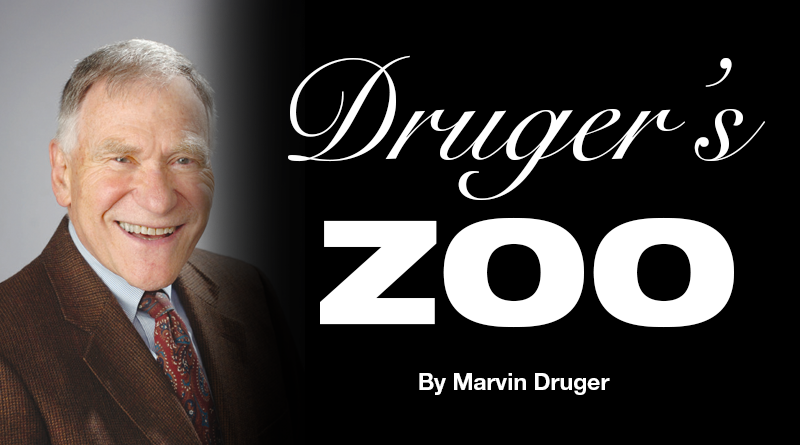Guidelines for Living Well
By Marvin Druger
 Each of us develops guidelines for living that govern our lives. We adapt to these guidelines and try not to violate them. In this article, I will discuss some of the guidelines that have evolved in my life that may be relevant to others.
Each of us develops guidelines for living that govern our lives. We adapt to these guidelines and try not to violate them. In this article, I will discuss some of the guidelines that have evolved in my life that may be relevant to others.
1. Everyone is unique and has special talents. This is a biological fact. Even identical twins who have the same genes have different environments and each twin is different. This is true for all living things. This means that each of us has special talents and weaknesses. Uniqueness means that someone can be taller, smarter, richer, etc. than others, but nobody is “better” than anyone else. So, every individual deserves respect and admiration for his or her unique traits. We should try to identify our unique abilities and nurture them. Schooling, including college, should be an exploration of a student’s unique talents and interests. The goal is to discover where you fit in life.
2. We learn from everything that we do and everything that we do becomes part of who we are. We forget information, but we do not readily forget experiences. We never know when an apparently insignificant experience will have a major influence on our lives. In my many years of teaching, I always required students to attend all of my classes, or suffer grade consequences. Indeed, my policy was that you received an F in the course if you did not attend class and participate fully, regardless of your grades on exams. As I grew older, I relaxed this policy a bit and would simply lower the student’s grade if he or she didn’t show up in class. This policy was controversial. Many professors doubtless believe that learning the course information is what’s most important, regardless of class attendance. But, if students do not attend class, they miss that experience, and they might have had a brilliant epiphany as a result of some comment during the lecture. In my view, students are in class for the experience and not so much for the information. They can get the information by reading a text. One student remarked, “But, if I’m experiencing your class, then I’m missing another experience.” I replied, “If the other experience is doing the laundry, that can wait. You have to choose which experiences you think would be most worthwhile.”
One day, when I was an undergraduate at Brooklyn College, I noticed a poster advertising that Theodosius Dobzhansky, a professor at Columbia University, was giving a talk about Drosophila (fruit flies) in South America. I was free that afternoon and I was intrigued by the professor’s name and that he was giving a talk on flies in South America. I thought there were people in South America, not flies? I went to the talk and was fascinated by it. When I attended Columbia University as a graduate student, I remembered the talk and sought out Dobzhansky and became his Ph.D. student. So, my entire scientific career pathway traces back to Dobzhansky’s talk at Brooklyn College that I attended by chance.
A young lady in my class came up to me at the end of my lecture class on photosynthesis. “That was fascinating,” she said, “I’m going to write my term paper for English class on that topic.” I never saw her again, but I fantasized that she wrote the paper on photosynthesis, earned an A in the English course, majored in journalism and went on to win a Pulitzer prize. It may not have happened, but who knows which experience may have a profound effect on our lives? Be there, or you will never know what you missed.
3. Know yourself and like yourself. People often say, “I have big problems. I need to escape for a vacation.” But they forget that you take yourself with you wherever you go. So, you really can’t get away from yourself. The solution is to get to know yourself and to recognize your special traits. Learn to respect and admire those things that you do best and try to improve on what you don’t like about yourself.
4. Persevere to accomplish your goals. Do your best and don’t give up. It is indeed true that “the squeaky wheel gets oiled.” If you have an important cause, don’t let obstacles stand in your way. If you can’t overcome obstacles one way, try another way. Persist.
5. Get the job done. Story Musgrave is a former astronaut. He flew six space missions (including one to fix the Hubble telescope), and he earned six academic degrees (including a degree in mathematics and statistics from Syracuse University and a medical degree). When he visited Syracuse University to speak at the dedication of the “Patricia Meyers Astronomy Learning Center in Holden Observatory,” I asked him how it was possible to accomplish so much. His reply was, “I set my goals and I get the job done!”
6. Be a motivated self-learner. You can learn anything, if you really want to learn it. Mostly, our inability to learn something comes from lack of true motivation to learn it. When students told me, “biology is too difficult for me to learn,” I interpreted that statement as, ”I’m really not that interested in learning biology.” Instead of depending on a teacher for learning, depend upon yourself. I’ve often thought that it might be best for the teacher to give exams, but deliberately do a terrible job of teaching. This would encourage students to learn by themselves.
7. “Get it!” I used to get upset when I encountered students who were goofing around and were not very interested in academic learning. I expressed my feelings to my course assistant. Her response was, “They just don’t get it… yet.” This comment changed my approach to such students. From then on, when I met such students, I thought to myself, “This student just doesn’t “get it… yet.” This student will “get it” eventually, but just doesn’t “get it …yet.” This is so true for all of us. We may not “get it” now, but, hopefully, we will eventually “get it.”
8. Do it now! We all tend to procrastinate and delay what could be done now. A colleague told me, “Never let a piece of paper pass your desk twice.” I adopted that guideline. Students used to ask me for a letter of recommendation. If I knew the student well enough, I would say, “Sure. When is it due?” … and put the task aside to be done later on. Then, I adopted the “do it now” approach. When a student would ask for a letter, I would say, “Sure. Do you have a few minutes?” I would then interview the student and write the letter in the student’s presence. I would put the letter in an envelope, seal it and sign it on the seam, and give the letter to the student. Fait accompli. The “do it now” approach requires determination, but it provides peace of mind and a sense of accomplishment.
‘If you have an important cause, don’t let obstacles stand in your way. If you can’t overcome obstacles one way, try another way. Persist.’
9. Think about what you are doing. Don’t just “do.” Oftentimes, we are so busy doing things that we don’t pause to think about what we are doing or why. I learned this guideline from my mentor when I was a postdoctoral fellow at the Commonwealth Scientific and Industrial Research Organization (CSIRO) at the University of Sydney in Australia. I was working on my research around the clock. I discovered something interesting that I wanted to tell my mentor about. I found my mentor lying very still on a sofa in the tea room. I was concerned about him. I asked, “Jimmy, are you OK?” Jimmy didn’t move a muscle and replied, “I’m pondering the definition of fitness.” This remark made me realize the importance of, sometimes, stopping what you are doing to think about what you are doing. We rush through life too quickly and should take time to think about what we are doing and why.
10. Be a good listener. Everyone likes an active, good listener, not a talker. We all tend to talk about ourselves, since our personal experiences are those we know best. I am a talker and not a good listener. I attended a workshop on listening. I was assigned a partner. We talked to each other. In one exercise, we were supposed to display inattentive behavior, and see how it felt. In another exercise, we were supposed to show active interest in what the other person was saying, and see what that felt like. It was clear that warm and friendly feelings were the result of a person actively listening to what you were saying. Despite the workshop, I still tended to talk too much, especially about myself. I confessed this flaw to a student and said, “I talk too much.” the student replied, “But you have a lot to say.” This student earned an A in my course.
11. Be kind, thoughtful and caring about others. Imagine yourself in the other person’s place. Do kind deeds whenever you can.
12. Laugh a lot. There is humor in every situation, even tragedies. When my dear wife was on the verge of her death, her last words to me were, “Marvin, shut up!” Humor heals and is a blessing for those who can view the world in a humorous way.
13. This, too, shall pass. This guideline was adopted by me as a result of a memorable incident. As newly elected president of the National Sciences Teachers Association (NSTA), I was giving a pep talk to the board of directors. The person who had been executive director of the organization for 14 years was in the room. I enthusiastically talked about all the great things we would accomplish. The executive director had a slight smile on his face. I stopped in the middle of my remarks and said to him, “I know what you’re thinking. This, too, shall pass.” He started laughing. That was exactly what he was thinking. He had seen many presidents come and go, and each one was going to change the world for the better. But he knew that this, too, shall pass. So, whenever incidents happen, keep this guideline in mind.
There are many more guidelines for life that can be listed. These guidelines grow out of personal experiences. They govern our behavior. Living by these guidelines requires sensitivity, thought, and determination. I know that you can add your own guidelines and I encourage you to do so. They will make you who you are.

